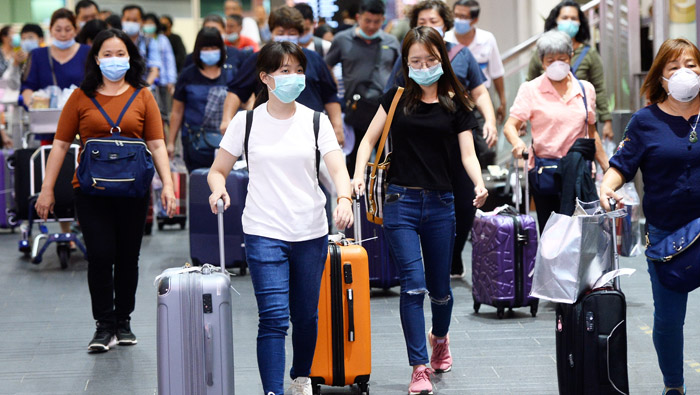
Muscat: The global travel industry is likely to face losses of more than $100 billion this year alone as countries continue to issue travel restrictions to prevent the spread of coronavirus, the International Air Transport Association (IATA) said.
With the outbreak and rapid spread of coronavirus across the globe, the travel sector of the country is taking a hit and many airlines, including Oman Air, have cancelled flights to destinations in coronavirus-affected countries.
Passengers who do not wish to or are unable to travel on Oman Air can now change their travel plans, without having to pay a rebooking fee.
Paul Starrs, Oman Air Chief Commercial Officer, said, “We want to assure our guests that we understand the challenges everyone is facing because of the actions that governments around the world are taking. Our promise to our valued guests is quite simply this: Go ahead, make your flight bookings with us and there will be zero booking-change fees should you need to alter your travel plans. We are committed to providing world-class service to all our guests and we want everyone to know that they can book with confidence.”
Similar cancellations and rebooking facilities have been issued by other GCC airlines. Flights arriving to Kuwait from several countries have been suspended. A statement from the Kuwait News Agency, KUNA, said the Kuwaiti government reviewed “the suspension of flights to and from China, Hong Kong, Iran, South Korea, Thailand, Italy, Singapore, Japan and Iraq.” In addition, Kuwait’s cabinet decided “to suspend for one week all flights from Bangladesh, the Philippines, India, Sri Lanka, Lebanon and Egypt.”
The Dubai-based Emirates has also said it will not charge passengers a fee for changing their flight plans. Adnan Kazim, Chief Commercial Officer, Emirates, said, “We want our customers to feel fully supported, comfortable and confident when making travel plans, while offering them the best fares, without incurring change fees should they decide to delay or adjust dates.”
The situation remains dynamic and we will continue to look at ways to provide flexibility, convenience and peace of mind for our customers.”
Commenting on COVID-19’s impact on the GCC’s travel market, Vijai D’Cunha, Assistant General Manager at Marmul Travel & Tours, said the spread of infectious diseases was invariably linked to travel, which would be further impacted by bans issued to people from coronavirus-affected countries.
“The elements of the hospitality industry, such as airlines, hotels and the retail sector are facing potential impacts in the form of travel curtailments and deferments, cancellations of hotel bookings, and no-shows,” he explained. “Around 30 per cent of our business has been affected due to the current situation as the travel ban has affected most of our routine holiday bookings,” he added.
“Some expats planning their annual vacation haven’t yet firmed up their travel plans, and are likely to put their plans on hold,” said D’Cunha. “Travel bookings for vacations, especially those that usually start to book in March and April, are going a lot slower, compared to the same period last year. Corporate sector business and official travels have also been postponed or cancelled. Overall, air travel, hotels and local transportation have seen a dent in business.”
IATA has updated its analysis of the financial impact of the novel coronavirus public health emergency on the global air transport industry. It now sees 2020 global revenue losses for the passenger business between $63 billion (in a scenario where COVID-19 is contained in current markets with over 100 cases as of March 2, 2020) and $113 billion (in a scenario with a broader spreading of COVID-19).
According to IATA, financial markets have reacted strongly. “Airline share prices have fallen nearly 25 per cent since the outbreak began -- some 21 percentage points greater than the decline that occurred at a similar point during the SARS crisis of 2003. To a large extent, this fall already prices in a shock to industry revenues much greater than our previous analysis.”